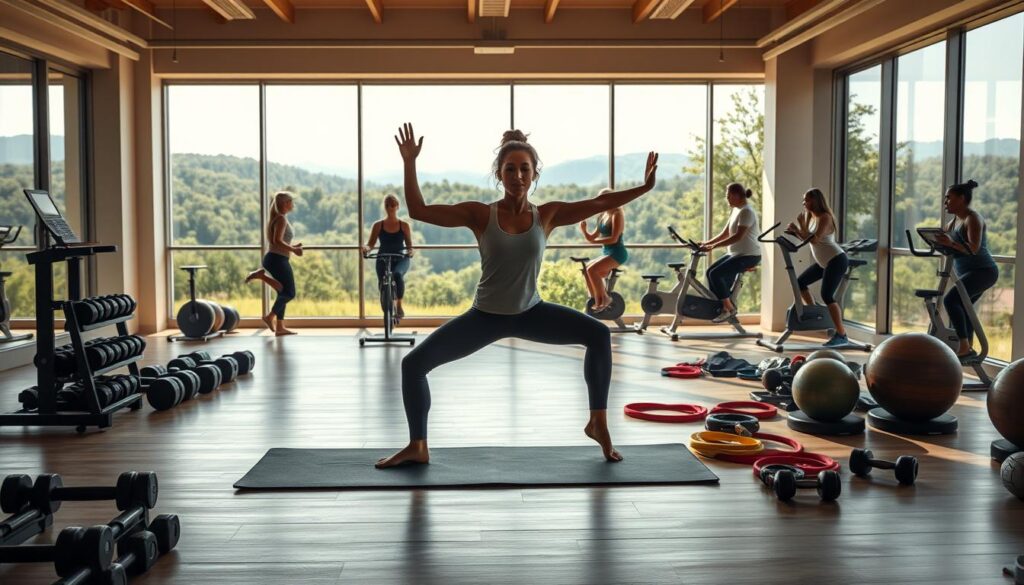2025 Workout Routines Proven to Boost Mental Well-Being
Ever thought about how exercise can change your body and mind? Today, we know how important our mental health is. We’re going to look at the best workouts for 2025 that can help your mind.
These exercises are not just for your body. They can also make you feel better mentally. Let’s explore how to improve your mental health through exercise.

A serene, minimalist fitness studio with natural lighting streaming through large windows. In the foreground, a person performing a low-impact yoga pose, their face expressing calm focus. In the middle ground, weightlifting equipment and resistance bands neatly arranged, suggesting a holistic approach to exercise. The background features motivational wall art depicting elements of nature, conveying a sense of mental and physical wellbeing. The overall mood is one of tranquility, balance, and scientific rigor.
Key Takeaways
- Exercise is key for better mental health.
- Science-backed workouts fight stress and anxiety.
- Trying different workouts keeps you motivated.
- Working out with others builds emotional strength.
- Yoga and mindfulness boost your mental health.
Understanding Mental Well-Being and Physical Activity
Mental well-being is about your emotional, psychological, and social health. It shapes how you think, feel, and act every day. It’s key to a happy life. Exercise helps a lot, making you feel better, less anxious, and mentally strong.
Exercise and mental health are closely linked. Activities like running, swimming, or walking boost endorphins. These chemicals make you feel happier and less stressed.
Also, exercise helps you meet new people. You can join groups or play sports together. This improves your mood and emotional health. Having friends is good for your mind.
Exercise does more than just keep you fit. It also makes your mind healthier. By exercising regularly, you can handle life’s ups and downs better. It helps you stay strong and positive.
The Science Behind Exercise and Mental Health
Learning about the science of exercise and mental health shows how moving our bodies helps our minds. When we exercise, our bodies make happy hormones like endorphins and serotonin. These hormones make us feel better and less stressed.
This is key to understanding the cognitive benefits of exercise. It not only makes us happy but also helps us think better. We can focus and remember things more clearly.
Studies show that moving our bodies makes our brains change and grow. This helps us handle feelings like anxiety and sadness better. Exercise even makes our brains grow in places important for learning and feeling.
This shows how important moving is for our mental health. It shows a strong link between a healthy body and a happy mind.
Science-backed workout routines 2025 Exercise for mental health improvement
Adding good workout routines to your day can really help your mind. Doing cardio like running or swimming makes you stronger and smarter. It also makes you feel happier and less worried.
Cardiovascular Exercises and Their Cognitive Benefits
Cardio workouts are great for your brain. They make your brain get more blood, which helps grow new brain cells. This makes you better at remembering things and paying attention.
- Enhanced memory retention
- Improved focus and attention span
- Reduced symptoms of depression and anxiety
Things like long walks or fast bike rides are good for your heart. They also make you feel better emotionally and mentally.
Strength Training for Emotional Resilience
Strength training does more than just make you strong. It helps you feel more confident and able to handle stress. As you get better at lifting weights, you feel more disciplined and proud of yourself.
- Boost self-confidence
- Enhance your ability to cope with stress
- Foster mental toughness
Mixing cardio and strength training in your routine is smart. It helps you feel better mentally and physically.
Latest Trends in Mental Health Workouts
Fitness is changing fast, with a big focus on mental health. You might see new fitness programs that mix exercise with mental health. These programs help manage stress and build emotional strength.
Online workout sites are getting very popular. They offer classes that help your mental health. You can find yoga to intense workouts, all with a focus on your mind.
Mental health apps are also key. They have guided workouts for emotional health. This makes it easy to stay on track and feel good.
Now, classes mix physical and mental exercises. They help you connect with your mind while exercising. You can pick what fits your goals best.
| Trend | Description |
|---|---|
| Online Platforms | Accessible classes that incorporate mindfulness and physical challenges. |
| Mental Health Apps | Guided workouts that focus on mental clarity and emotional stability. |
| Integrative Classes | Sessions that merge physical fitness with mental awareness techniques. |
Trying out these trends can really improve your life. Look for activities that challenge your body and lift your mind.
Effective Exercise Plans for Mental Health
Creating good exercise plans for mental health is all about balance. Group workouts help you feel connected. At the same time, personal fitness plans meet your unique needs and goals.
Group Workouts and Community Connection
Group workouts are great for your mind. They offer physical benefits and bring people together. This shared experience boosts mood and fights loneliness.
Individualized Fitness Programs
Personal fitness plans are all about you. They let you set your own pace and focus on what you need. This way, you build emotional strength and feel truly satisfied with your progress.
Evidence-Based Fitness Activities to Consider
Doing evidence-based fitness can really help your mental health. Many studies show that regular exercise makes you feel better emotionally and mentally. Here are some great activities that help both your mind and body:
| Activity | Benefits |
|---|---|
| Dance | It makes you feel happier, boosts creativity, and helps you meet new people. |
| Martial Arts | It helps you focus, builds self-confidence, and eases stress. |
| Hiking | It connects you with nature, gets you fit, and lowers anxiety. |
| Outdoor Yoga | It relaxes you, makes you more mindful, and clears your mind. |
Trying these activities can really help your mental health. Adding them to your routine can make you feel better overall.
Yoga and Mindfulness: Merging Physical and Mental Health
Yoga helps balance your body and mind. It offers many styles to fit your needs. This way, you can feel clearer and more stable.
Each style has its own way to help your mind. It does this through movement and breathing.
Different Yoga Styles for Mental Wellness
Yoga has many styles, each helping your mind in its own way.
| Yoga Style | Description | Mental Benefits |
|---|---|---|
| Hatha Yoga | A gentle introduction to the most basic yoga postures. | Enhances relaxation, stress reduction, and emotional balance. |
| Vinyasa Yoga | Offers a dynamic flow of postures, linking breath with movement. | Improves focus and mindfulness through fluid transitions. |
| Kundalini Yoga | Emphasizes spiritual awakening and energy release. | Promotes profound inner peace and self-awareness. |
Integrating Mindfulness into Your Routine
Adding mindfulness to your day can make yoga even better. It helps you stay present and appreciate yourself more. Here are some ways to add mindfulness:
- Engage in daily meditation, even if for a few minutes.
- Practice breath awareness during yoga sessions.
- Keep a gratitude journal to reflect on positive experiences.
- Limit distractions during your yoga practice.
Tips for Staying Motivated with Your Fitness Program
Staying motivated in a fitness program can be tough. To succeed, use simple tips to keep you going. Set both short and long goals. Short goals give you quick wins, while long goals give you a big goal to work towards.
Work out with a friend or join a fitness group. Having someone to share your goals with helps a lot. Celebrate every small win. Give yourself rewards for reaching goals to make staying fit more fun.
Try new things in your workouts. Doing different activities keeps things interesting and challenges your body. Changing your routine often keeps you excited and motivated.
Keep track of your progress. Write down your workouts and how you feel. Seeing your progress helps you stay motivated for more workouts.
| Motivation Tips | Description |
|---|---|
| Set Goals | Define both short-term and long-term objectives to track progress. |
| Social Accountability | Work out with friends or join a community for support. |
| Reward Milestones | Celebrate achievements with rewards to stay motivated. |
| Incorporate Variety | Change your routine to prevent boredom and enhance engagement. |
| Document Progress | Keep a journal to reflect on your fitness journey and mental health improvements. |
Creating a Balanced Workout Routine
It’s key to have a balanced workout routine for your mind and body. Mixing up your exercises keeps things fun and interesting. This way, you work out different muscles every time.
Incorporating Variety to Stay Engaged
There are many ways to add variety to your workouts. Try mixing cardio with strength training or join different fitness classes. Activities like cycling, swimming, yoga, and weight training are great. Changing your routine often helps your muscles grow stronger.
Setting Realistic Goals for Progress
Setting realistic fitness goals is important. Break big goals into smaller ones to see your progress. Think about how often you’ll work out and what exercises you like. Keeping track of your progress motivates you to keep going.

A well-balanced workout routine in a spacious, sun-drenched gym. In the foreground, a person performing a series of yoga poses on a sleek exercise mat, their body flowing with grace and strength. Surrounding them, an array of free weights, resistance bands, and exercise balls strategically arranged, inviting a varied, full-body workout. In the middle ground, individuals engaged in a range of activities – some lifting weights, others cycling on stationary bikes, all radiating an aura of focused determination. In the background, floor-to-ceiling windows offer a panoramic view of a lush, verdant landscape, imbuing the scene with a sense of calm and rejuvenation. The lighting is warm and natural, accentuating the harmonious blend of physical and mental wellness.
Resources for Discovering New Workouts
Finding good workout resources can really help your fitness journey. Today, many platforms offer new exercises for all levels and tastes. Apps like Peloton and Nike Training Club let you try different routines at home.
YouTube has channels for fitness that focuses on mental health. These videos make working out fun and help your well-being. Social media is also great for finding trainers and health groups.
Local gyms have cool classes and programs. Joining group fitness can make you more motivated and accountable. It’s a chance to try new things and care for your mental health.
Success Stories: Transformations through Exercise
Regular physical activity can change lives. Many people have started inspiring fitness journeys. They have improved their mental health.
One person started jogging and struggled at first. But they kept going and got stronger. They felt happier and clearer in their mind.
Strength training has also changed lives. People feel better about themselves when they lift weights. They see their strength and looks improve, showing that success is more than just physical.
Yoga has brought calm and physical benefits to many. It helps with mindfulness and flexibility. These stories show that exercise helps our minds and hearts too.
How to Measure the Impact of Workouts on Mental Health
It’s key to measure how workouts affect our mental health. By tracking progress, we can see how exercise helps our well-being. There are many ways to do this effectively.
A mood log is a great tool. It lets you write down how you feel before and after working out. This way, you can spot patterns and see how different activities make you feel.
Another useful tool is fitness assessment tools. These include heart rate monitors and activity trackers. They show how different workouts change your mental state over time.
Psychological tests can also help. They measure mood, stress, and thinking skills before and after exercise. This gives us a clear picture of how workouts impact our mental health.

A well-lit, close-up shot of a person’s hands carefully recording data on a tablet, surrounded by various fitness and health-tracking devices like a smartwatch, heart rate monitor, and resistance bands. The background is a serene, minimalist space with natural light filtering in, conveying a sense of focus and mindfulness. The overall mood is one of study and contemplation, as the subject diligently examines the relationship between their physical activity and mental well-being.
In short, mood logs, fitness tools, and psychological tests are all helpful. They give us different views of how exercise affects our mental health. Together, they help us understand our fitness journey better.
Conclusion
Adding science-backed workouts to your life can really help your mental health. Cardio exercises make your brain work better. Strength training helps you feel emotionally strong.
Every workout is special in its own way. It helps you feel better overall. This article showed how exercise is linked to good mental health.
Start taking steps to add these workouts to your life. You can join groups or make your own fitness plan. Doing this regularly makes you happier and healthier.
Remember, getting fit is a journey. Choosing the right workouts can make you mentally clear and strong. Being active is good for you. Your mind and body will be grateful.
FAQ
What are the best exercise routines for improving mental health?
Good exercises for mental health include running, cycling, and swimming. Strength training is also great. These activities release happy chemicals and boost mood.
How does exercise help my mental health?
Exercise makes happy chemicals like serotonin and dopamine. It lowers stress and anxiety. It also makes our brains work better.
Are there new trends in mental health workouts for 2025?
Yes, online fitness and meditation apps are getting popular. They help with mental health. Workouts that mix physical activity with mindfulness are also trending.
Can group workouts help my mental health?
Group workouts are great for mental health. They help you feel connected and supported. Working out with others keeps you motivated and happy.
What types of yoga are good for my mental health?
Hatha, Vinyasa, and Kundalini yoga are all good. Hatha helps you relax. Vinyasa keeps you moving. Kundalini helps with spiritual growth.
How can I see if my workouts are helping my mental health?
Use mood logs, fitness trackers, and tests to track your mental health. Seeing how your workouts affect your mood helps.
What tips are backed by science for staying motivated in my workouts?
Set achievable goals and try different exercises to avoid boredom. Work out with friends for support. Reward yourself for reaching goals to stay excited.
What activities are proven to improve mental health?
Dance, martial arts, hiking, and outdoor yoga are all good. They help your mood and brain through fun and social activities.







